- Home
- Lisa Wingate
Good Hope Road
Good Hope Road Read online
Table of Contents
Title Page
Copyright Page
Dedication
Acknowledgements
CHAPTER 1
CHAPTER 2
CHAPTER 3
CHAPTER 4
CHAPTER 5
CHAPTER 6
CHAPTER 7
CHAPTER 8
CHAPTER 9
CHAPTER 10
CHAPTER 11
CHAPTER 12
CHAPTER 13
CHAPTER 14
CHAPTER 15
CHAPTER 16
CHAPTER 17
CHAPTER 18
CHAPTER 19
CHAPTER 20
CHAPTER 21
CHAPTER 22
A CONVERSATION WITH LISA WINGATE
QUESTIONS FOR DISCUSSION
Praise for Lisa Wingate’s
Tending Roses
“A story at once gentle and powerful about the very old and the very young, about the young woman who loves them all. In Kate, Lisa Wingate has created a wonderful character.”
—Luanne Rice, New York Times bestselling author of True Blue
“Wingate’s touching story of love and faith proves the old adage that we should take time to smell the roses and try to put our modern problems in perspective.”
—Booklist
“Stop what you are doing and experience Tending Roses … a rich story of family and faith.”
—Lynne Hinton
“You can’t put it down without … taking a good look at your own life and how misplaced priorities might have led to missed opportunities. Tending Roses is an excellent read for any season, a celebration of the power of love.”
—El Paso Times
“This novel’s strength is its believable characters … Many readers will see themselves in Kate, who is so wrapped up in her own problems that she fails to see the worries of others.”
—American Profiles Weekly Magazine
“Get your tissues or handkerchief ready. You’re going to need them when you read Lisa Wingate’s book Tending Roses. Your emotions will run the gamut from laughing loudly to shedding tears as you read the story.”
—McAlester News-Capital & Democrat
Written by today’s freshest new talents and selected by New American Library, NAL Accent novels touch on subjects close to a woman’s heart, from friendship to family to finding our place in the world. The Conversation Guides included in each book are intended to enrich the individual reading experience, as well as encourage us to explore these topics together—because books, and life, are meant for sharing.
Visit us on-line at www.penguinputnam.com.
NAL Accent
Published by New American Library, a division of Penguin Putnam Inc., 375 Hudson Street,
New York, New York 10014, U.S.A. Penguin Books Ltd, 80 Strand, London WC2R 0RL, England Penguin Books Australia Ltd, 250 Camberwell Road, Camberwell, Victoria 3124, Australia Penguin Books Canada Ltd, 10 Alcorn Avenue, Toronto, Ontario, Canada M4V 3B2 Penguin Books (N.Z.) Ltd, Cnr Rosedale and Airborne Roads, Albany, Auckland 1310, New Zealand
Penguin Books Ltd, Registered Offices: Harmondsworth, Middlesex, England
Published by New American Library, a division of Penguin Putnam Inc.
First Printing, April
Copyright © Lisa Wingate, 2003
FICTION FOR THE WAY WE LIVE REGISTERED TRADEMARK—MARCA REGISTRADA
LIBRARY OF CONGRESS CATALOGING-IN-PUBLICATION DATA: Wingate, Lisa.
Good Hope Road / Lisa Wingate p. cm.
eISBN : 978-1-101-11868-9
1. Women—Middle West—Fiction. 2. City and town life—Fiction. 3. Middle Wsst—Fiction. 4. Tornadoes—Fiction. I. Title.
PS3623.I66 G’.6—dc21 2002033812
Without limiting the rights under copyright reserved above, no part of this publication may be reproduced, stored in or introduced into a retrieval system, or transmitted, in any form, or by any means (electronic, mechanical, photocopying, recording, or otherwise), without the prior written permission of both the copyright owner and the above publisher of this book.
PUBLISHER’S NOTE
This is a work of fiction. Names, characters, places, and incidents either are the product of the author’s imagination or are used fictitiously, and any resemblance to actual persons, living or dead, business establishments, events, or locales is entirely coincidental.
BOOKS ARE AVAILABLE AT QUANTITY DISCOUNTS WHEN USED TO PROMOTE PRODUCTS OR SERVICES. FOR INFORMATION PLEASE WRITE TO PREMIUM MARKETING DIVISION, PENGUIN PUTNAM INC., 375 HUDSON STREET, NEW YORK, NEW YORK 10014.
The scanning, uploading and distribution of this book via the Internet or via any other means without the permission of the publisher is illegal and punishable by law. Please purchase only authorized electronic editions, and do not participate in or encourage electronic piracy of copyrighted materials. Your support of the author’s rights is appreciated.
http://us.penguingroup.com
To my grandparents
Elvera and Norm,
Who made us believe
In love at first sight,
Who showed us young folks
How to dance a soft shoe,
Who taught us that
True love lasts a lifetime,
And beyond… .
ACKNOWLEDGMENTS
On any journey, it is the unplanned happenings that make the trip unique. The past year since the publication of Tending Roses has been a jump completely off the map. I have so many times been helped along by the grace of friends, the kindness of strangers, and the guidance of those who knew the world of book publishing much better than I did. I could write a volume about the good deeds and happenstances that have led to the publication of this second book, Good Hope Road. But that is another story, so I will settle for this quick list of wonderful people to whom I am indebted for many reasons.
My thoughts, prayers, thanks, and gratitude go out to the many readers of Tending Roses who took the time to write letters and e-mails, to share emotions, struggles, prayers, encouragement, and to share the book with others. There are no words to express what your letters meant and what your recommendations meant to the success of the book. I am honored beyond measure, and truly blessed.
My heartfelt thanks go out to friends who helped with the research and editing of Good Hope Road—in particular Amanda Carter, for incredible proofreading; to Dr. Phil Webb and Pam Slagle, for invaluable medical consultation, and for not slapping me when I confessed that, what I know about emergency medical treatment, I learned from watching soap operas. Thank you also to my treasured friend and favorite computer girl, Mandy Koger, for using your talent and expertise to create the Web site, www.LisaWingate.com.
My gratitude once again goes out to my wonderful agents, past and present, Lisa Hagan of Paraview, and Claudia Cross of Sterling Lord (Literistic). Thank you for holding my hand, yanking it when needed, and guiding me through the strange and awesome publishing process. Thank you also to the fantastic staff at New American Library, and especially to my editor, Ellen Edwards.
Thank you to all the booksellers, librarians, and book clubs who have so graciously invited me for book signings and speeches for Tending Roses. My gratitude also to all of the newspaper and television personnel who gave coverage to the book and to the story behind it. You have made this year everything I hoped for, and more than I ever dreamed. Special thanks to those booksellers who devotedly recommended and shelved Tending Roses, including Michelle, Lavone, Verna, Sharon, and many more, but especially Christopher Cleveland, for being the first bookseller to read a premarket copy of Tending Roses and telling me there was a big audience out there for the book. What an incredible kindness that was.
Last, thank you to m
y family, to my aunts, uncles, brothers, parents, and grandparents on both sides for helping to drum up publicity, for housing me when I came for book signings and speeches, and for each buying at least one copy of the book. Sometimes it helps to come from a big family!
My love and thanks also, and as always, to my husband and my two sons. You are my heartbeat, the three of you, the answer to my prayers, the thing I treasure most. How blessed we are to have each other.
CHAPTER 1
JENILEE LANE
There is a moth in a cocoon outside the window. It has been there for months, twisted by the wind, dampened by the rain, a reminder that the windowframes should have been cleaned and painted last fall. It is spring, and there is a tiny hole in the end of the cocoon, a small probe pushing through, sawing back and forth, struggling to free the creature inside.
The moth has labored for hours, and only now has it pushed two legs through the hole. Inside in the darkness, does it know why it must struggle? Somewhere in the mass of cells and neurons that make up its tiny body, is it aware that the struggle is God’s way of pumping fluid into its wings? If not for the struggle, it would come into the world with a swollen body and flightless wings. It would be a creature without strength, unable to fulfill its purpose.
I wonder if it can sense the warmth of my hand on the other side of the glass as night falls and another spring storm blows in.
On nights like this, I do not sleep. I sit awake and listen as the storms howl through the valley. Like the moth, I have emerged in a place that was once beyond my imagining.
Outside, I hear a gust of wind, and I remember. I remember where I have come from, and it is as if every blessing in my life has been showered anew around me.
I fall to my knees, and I thank God for everything. Even for the wind. For the fragments of my life that survived it, and the fragments that didn’t, and the things that were changed forever… .
On the afternoon of July 29, the entire town of Poetry, Missouri, was cast to the wind. The town rained down around me for what seemed like an eternity as the tornado receded into the sky and disappeared, spitting out what was left of Poetry.
I stood watching, thinking it was the most horrible, awesome sight I had ever seen, unlike anything I had experienced in my twenty-one years of living. If Daddy had been home he would have yelled at me for not having sense enough to go to the cellar. But once you start watching something so enormous and so vile, it pulls you in just as surely as if you were caught in the vortex itself. I don’t know what it is that makes people want to look into the face of evil… .
“Oh, my God. Oh, my God,” I remember saying. My mind couldn’t comprehend what was happening. Only a few minutes before, I had been fixing dinner for Daddy and my younger brother, Nate, listening to an old Bob Wills record, and wondering if the coming storm would bring rain. I was thinking about leaving again—having that fantasy where I packed Mama’s old suitcase and went … somewhere. The dream always came wrapped in a tissue-paper layer of guilt, so that I couldn’t see the contents clearly. Perhaps that was a merciful thing, because I knew Daddy and Nate couldn’t get by without me.
I heard branches slapping against the house as if the oak tree knew about the dream and was angry. Outside the window, a car sped by, a black Mercedes going too fast on the gravel, like it was running from something. It fishtailed back and forth on the curve, throwing rocks against the yard fence before it straightened and rushed onward.
Probably one of those doctors or lawyers leaving the resort on the lake, I thought. Probably doesn’t want his high-dollar car to get wet. They should stick to the paved roads where they belong.
The car disappeared down Good Hope Road, and the wind came up, roaring like a freight train. Hail pounded the roof, and debris whipped through the air, crashing into the house and barn.
When I ran to the screen door, the sky was swirling like a giant black cauldron. I watched as the cone of the tornado slowly separated from the ground and disappeared into the sky. Not a half mile away, a wall of rain was falling, but at our house the hail stopped suddenly. The roar faded, and destruction lay everywhere—pieces of wood and metal, tree branches, shredded furniture, torn clothing, shards of glass glittering like diamonds in the afternoon sunlight.
Bits of paper floated from the churning clouds, drifting, swirling, dancing, as if they had all the time in the world. They filled the sky like snow.
The air was so quiet I could hear the papers falling, rustling slightly against an eerie silence, like a battlefield after the battle, when only the corpses remain. I wondered where so much paper could have come from, and if it had been blown all the way from Poetry, three miles across the low hills.
The big oak tree in the yard moaned, its limbs heavy with a crusty coating of fresh hail. I stared at the ice, then turned around in disbelief, looking at our single-story brick house and seeing everything as it had always been—the peeling paint, the overgrown bushes, the torn window screen where Nate sneaked out of his bedroom at night.
A piece of paper fell lightly on the screen and hung there, fluttering against the window like a bird trying to break free.
I remember thinking, Why not us? Why not our house? Why is everything the same as it was yesterday, last week, last month, last year, ten minutes ago? Why wasn’t anything destroyed, or changed, or carried away … ?
I had the strangest sense of wishing that it had been. Then I realized how crazy that was. I should have been thanking God I was alive.
Turning around, I gazed at the wall of rain, now moving away toward the east, revealing the footprint of the beast—an enormous path of stripped earth and strewn debris, ending in a narrow swath of twisted trees just past Daddy’s wheat field. From there, it carved a jagged scar toward the horizon, toward Poetry. Where farms had been, there was nothing.
I wondered how God could let something so terrible happen at all.
A mile down the valley, the pecan orchard that had hidden old lady Gibson’s farmhouse stood splintered, the limbs hanging like broken bones. Near the road, a geyser of water sprayed into the air, mixing with the falling rain.
I realized the tornado had passed across the Gibson farm. Gasping the gritty air, I ran down the porch steps and across the yard. At the sound of the yard gate opening, Daddy’s bird dog rushed from under the house and slammed against my legs, sending me sprawling into the litter on the grass.
“Get away, Bo!” I hollered, grabbing his collar as he tried to bulldoze his way through the gate. “Get back in the yard, you big, stupid dog!” Daddy’s dogs were always big and stupid, and always trying to escape.
I held on as Bo plowed a furrow into the long, scrappy grass outside the gate and pounced on a bit of paper blowing by. Scrambling to my feet, I dragged him into the yard and struggled to hook him to his chain while he cavorted with the paper, grabbing it, then dropping it and pouncing on it again. I caught a quick glimpse of a face. A photograph. A baby. A birth announcement.
Securing the chain, I snatched the photograph away, dried it on my jeans, then looked at it with the same horrible fascination that had forced me to stare at the tornado.
Somebody’s baby. Just newborn. A girl. Seven pounds, six ounces. The space where the name would have been was torn away.
A coldness came over me, as if all of the blood in my body were draining to my feet and disappearing into the grass. For a moment I stood frozen. I didn’t want to move, or think, or be. I didn’t want to know what reality waited outside the yard fence, or who the baby was, or what might have happened to her. It was too awful to comprehend.
Come on, Jenilee. Come on. Get your head on straight… .
The voice in my mind sounded like Mama’s. At least the way I remembered her sounding. I slipped the photograph into my pocket and ran across the yard, leaving Bo yapping at the end of his chain.
Come on, Jenilee, hurry up, the voice reverberated as I rushed to the shed to get the pickup, then realized that Daddy and Nate had taken the picku
p to Kansas City that morning. There was nothing left but the tractor. I climbed on and started the engine.
No time to be afraid, just back it out of the shed and drive down to Mrs. Gibson’s house. It’s not the first time you’ve driven a tractor. Mama’s voice sounded insistently in my head. But I wondered: If she were really there, would she worry about what Daddy would say? Daddy didn’t let the tractor off the property, and he hadn’t liked Mrs. Gibson since her goats got in his pasture, and he shot them thinking they were deer, and she called the sheriff and had Daddy thrown in jail. After that, we didn’t have much to do with the Gibsons. We didn’t have much to do with anybody. Daddy had pretty well driven off all of the neighbors.
“Come on, Jenilee,” I muttered, wondering how my mind could still be thinking all the normal things when nothing around me was normal. Everything had been changed in an instant. I could see the destruction, yet I wanted to deny that it had happened.
The tractor squealed an ear-piercing complaint as I stopped on the road and tried to put it into forward gear. It jerked into motion, the rumble of the diesel engine seeming to shake the hushed earth as I steered through the debris on the road. The wind blew damp strands of blond hair across my face, pasting them against the film of perspiration on my cheeks. Tiny drops of rain cooled my skin as I brushed the hair away and stared at the furrow cut by the tornado, watching it grow larger and more surreal as I sped closer. Overhead the clouds parted, and muted afternoon sunshine streamed through the hole, seeming out of place against the dark clouds and ravaged earth.
Ruined trees and stripped earth surrounded me as I reached the Gibson place. The air smelled of dust and plaster, electrical burn, wet dirt, freshly cut wood, and rain. It was an unnatural scent, like nothing I could remember.

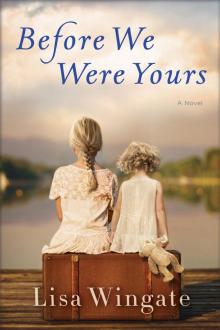 Before We Were Yours
Before We Were Yours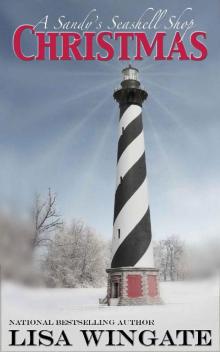 A Sandy’s Seashell Shop Christmas
A Sandy’s Seashell Shop Christmas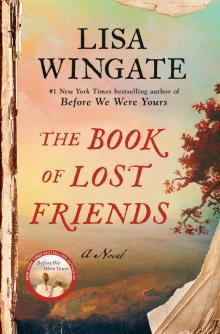 The Book of Lost Friends
The Book of Lost Friends Larkspur Cove
Larkspur Cove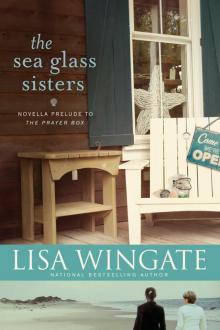 The Sea Glass Sisters
The Sea Glass Sisters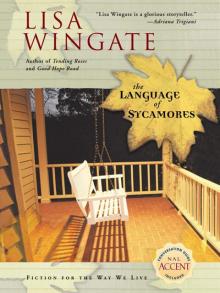 The Language of Sycamores
The Language of Sycamores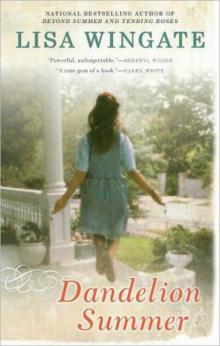 Dandelion Summer
Dandelion Summer Word Gets Around
Word Gets Around Beyond Summer
Beyond Summer Firefly Island
Firefly Island The Tidewater Sisters: Postlude to The Prayer Box
The Tidewater Sisters: Postlude to The Prayer Box Talk of the Town
Talk of the Town![Blue Sky Hill [01] A Month of Summer Read online](http://i1.bookreadfree.com/i1/03/29/blue_sky_hill_01_a_month_of_summer_preview.jpg) Blue Sky Hill [01] A Month of Summer
Blue Sky Hill [01] A Month of Summer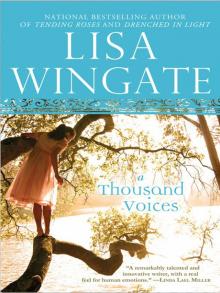 A Thousand Voices
A Thousand Voices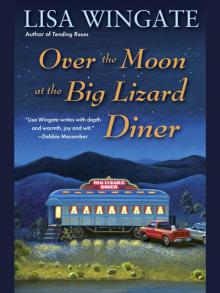 Over the Moon at the Big Lizard Diner
Over the Moon at the Big Lizard Diner Never Say Never
Never Say Never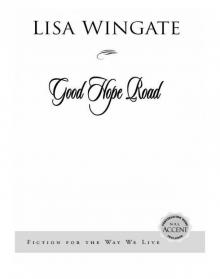 Good Hope Road
Good Hope Road The Summer Kitchen
The Summer Kitchen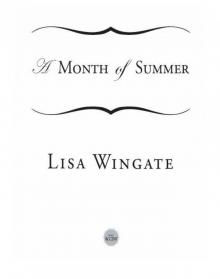 A Month of Summer
A Month of Summer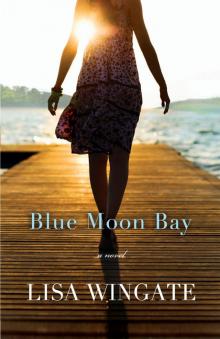 Blue Moon Bay
Blue Moon Bay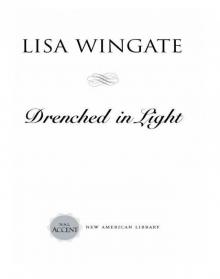 Drenched in Light
Drenched in Light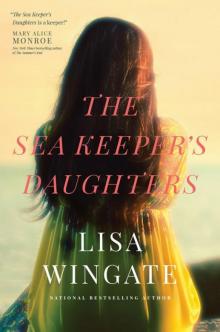 The Sea Keeper's Daughters
The Sea Keeper's Daughters